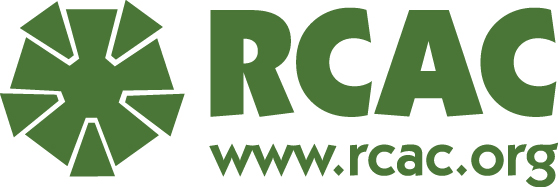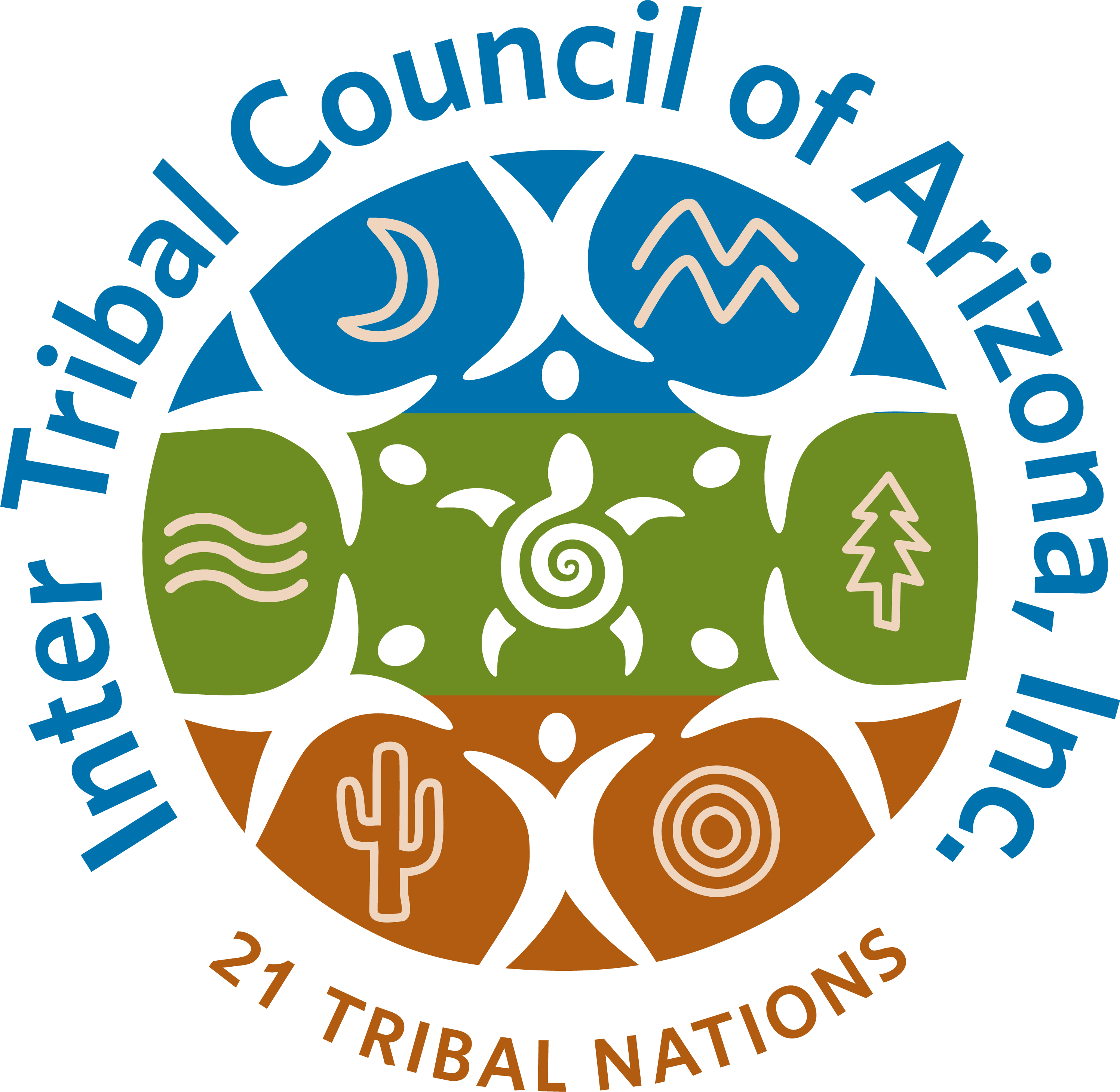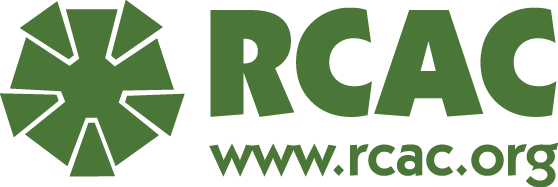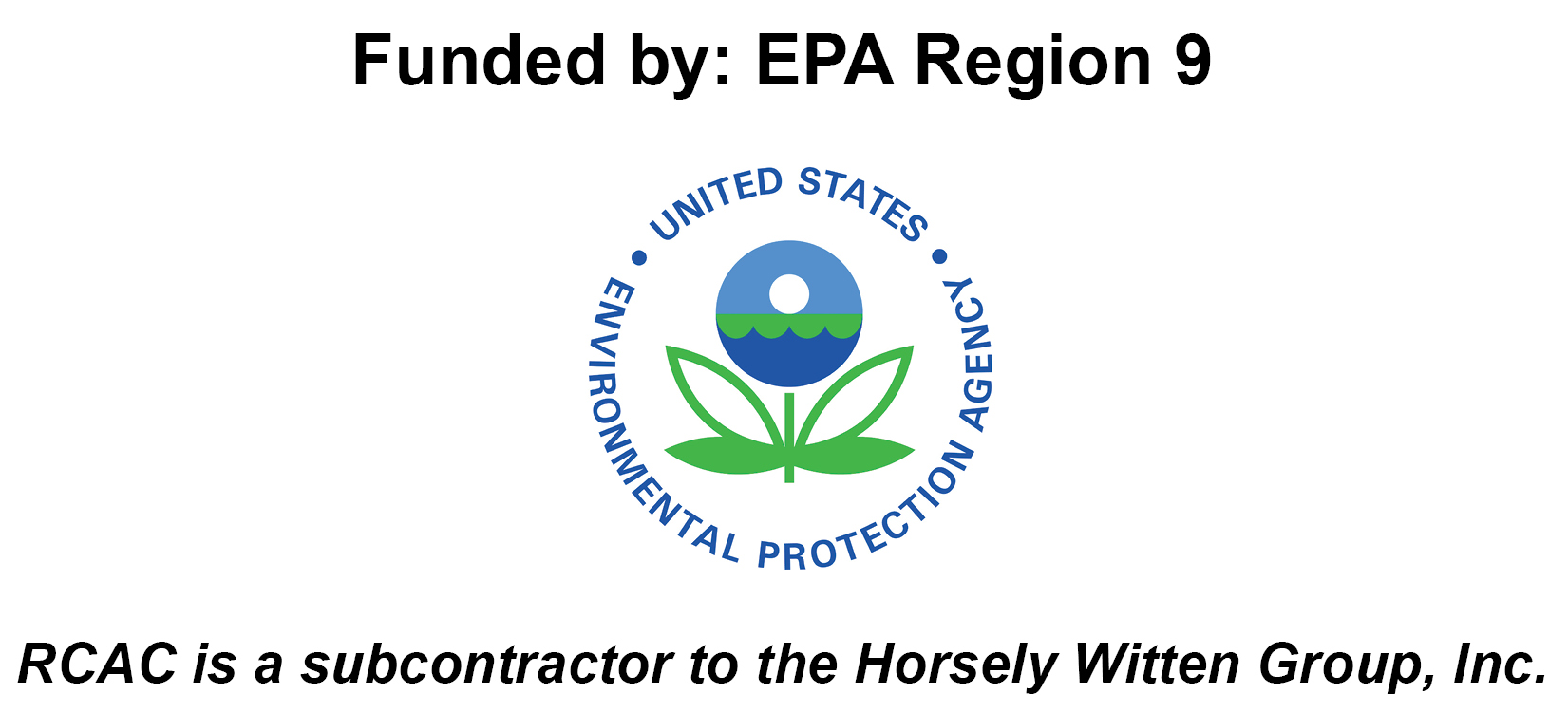Event Date & Time
5/3/2021 8:30 AM - 5/3/2021 12:30 PMLocation
ONLINE
Times listed are Pacific Time
US EPA RCAC Tribal Drinking Water Conference
Protecting drinking water quality and ensuring a sufficient supply are complex responsibilities. Tribal utilities must have the financial stability, managerial competence and technical skills to address their immediate and projected drinking water needs, and protect community health and well-being in a sustainable manner. They must make decisions on operating costs, aging infrastructure, and much more on a daily basis.
Join your colleagues, EPA and RCAC for this live, interactive event, to learn new skills, gain information, earn contact hours, network, and of course have a little fun!
Click here for session descriptions
Monday, May 3, 2021 · 9:00 AM -10:30 AM
Preparing For a Sanitary Survey
EPA conducts sanitary surveys at all water systems every 3-5 years. This session will help operators learn about the common deficiencies that are found at water systems and what can be done ahead of the survey to avoid these issues. If issues are identified, this session will teach you about correcting the issues, developing an EPA-approved corrective action plan, requesting extensions, and submitting proof of correction.
The recommended audience includes operators, managers, and board/council members.
Monday, May 3, 2021 · 9:00 AM -10:30 AM
Asset Management and Operations and Maintenance Planning
Asset management and O&M planning is key to successful management of a water system. This session will give operators and all levels of utility management the tools to be more efficient and strategic with funding, get approval from stakeholders, and be proactive rather than reactive:
· Gain information about different asset management tools and software
· Develop skills to communicate with water boards and ensure proper planning throughout all levels of management
· Identify what O&M Plans you need
· Learn how to develop an O&M plan
The recommended audience includes all management, board/council members and operators.
Monday, May 3, 2021 · 11:00 AM - 12:30 PM
Compliance Sampling101
There are many responsibilities that come with SDWA compliance monitoring. Most times operators are tasked with sample collection in their system. This session will look at the many different samples collected, and the bottles used. Participants will be given an opportunity to view proper sampling technique, resulting in consistent representative sample results.
Participants will learn:
· What determines our sampling requirements and the different types of SDWA compliance samples
· Who is qualified to collect drinking water samples
· How to determine representative sites
· How to use good technique to ensure consistent, quality sample results
· How to determine the correct bottle types
This workshop will give participants the information and resources they need to understand the different samples that are required and the responsibilities of the trained water sampler.
The recommended audience includes operators, utility managers and board/council members.
Monday, May 3, 2021 · 11:00 AM - 12:30 PM
Preparing and Recertifying Waivers
Have you ever thought about applying for a monitoring waiver? Have you looked at how much money this can save your water system? The session will teach you everything you will need to know about applying for a waiver.
Tuesday, May 4, 2021 · 9:00 AM - 10:30 AM
Elements of an Emergency Response Plan
A water system emergency is any situation in which customers are without water, or the water is unsafe to drink. Natural (Fires, floods, earthquakes, tsunamis, and droughts) and man-made disasters; what will you do when an emergency or disaster strikes? Do you have a written response plan? Do you have mutual aid agreements in place? How will you protect the health of your customers? The goal of an ERP is to increase the chance of successful outcomes when an emergency happens. Taking responsibility for emergency preparedness and response is key to reducing potential damage and accelerating recovery efforts for any disaster, large or small.
Participants in this workshop will learn:
· The wide variety of emergency situations to which water systems are exposed
· The key elements of an ERP
· How to identify the emergencies in your local area and develop an action plan (Standard Operating Procedures)
· How to create your own ERP using different templates based on your type of system (large, medium, small)
· How to establish effective mutual aid agreements using an approved template (e.g. - CALWARN)
· How to plan for recovery after an emergency (e.g. – time, material, costs, recordkeeping)
· How to conduct tabletop exercises for checking effectiveness of your ERP
This workshop will provide water system personnel with the information and resources to respond preemptively and proactively to most emergency situations.
The recommended audience includes managers, water system operators and board/council members.
Tuesday, May 4, 2021 · 9:00 AM - 10:30 AM
Tank Inspection and Maintenance
How do you know what is going on inside your storage tank? What goes into the process of choosing the correct type of tank for your water quality and needs? Every water tank must be periodically maintained to ensure long life of the tank and quality water within the tank. This session will review the many challenges regarding tank maintenance including:
· Tank selection and design process
· Tank inspection
· Tank maintenance
· Hydrology: groundwater qualities
· Tank’s impact on water quality
The recommended audience includes system operators and utility managers.
Tuesday, May 4, 2021 · 11:00 AM - 12:30 PM
Value Exercising and Funding
Flushing is a vital part of the health of any water system and even in times where water is in short supply, may be necessary to ensure the health of a drinking water distribution system. The flushing activity is the time when all the valves in the system can be exercised. This session is designed to assist the water operator in making sound choices when utilizing a precious resource to perform the needed task of flushing.
Tuesday, May 4, 2021 · 11:00 AM - 12:30 PM
SDWA 101
The Safe Drinking Water Act (SDWA) was established to protect the quality of drinking water. All public drinking water systems must meet health-based standards for contaminants, including performing standard monitoring and reporting. This workshop will help tribal drinking water operators learn their roles and responsibilities under the SDWA. Topics include history of drinking water regulation, an overview of contaminants and monitoring requirements, sampling plans, monitoring waiver, recordkeeping, and types of violations and steps to avoid them.
Recommended audience includes operators, managers, and board/council members.
Wednesday, May 5, 2021 · 9:00 AM - 10:30 AM
Preparing for a Sanitary Survey
EPA conducts sanitary surveys at all water systems every 3-5 years. This session will help operators learn about the common deficiencies that are found at water systems and what can be done ahead of the survey to avoid these issues. If issues are identified, this session will teach you about correcting the issues, developing an EPA-approved corrective action plan, requesting extensions, and submitting proof of correction.
The recommended audience includes operators, managers, and board/council members.
Wednesday, May 5, 2021 · 9:00 AM - 10:30 AM
Tribal Case Study (Improvements Using Technology)
Come hear about the latest technologies Tribal water systems are using to help operate and manage their utilities.
Recommended audience includes operators, utility managers and board/council members.
Wednesday, May 5, 2021 · 11:00 AM - 12:30 PM
Workplace Safety: How Not to Get Killed on the Job
Utility workers are at a high risk of risk of serious injuries and fatalities. Electrocution, trench collapse, confined space and falls are just some of the hazards that utility workers are routinely exposed to. A safety program is an essential part of your utility’s management system. A safety program reduces physical and financial risk and creates a work environment where employees can feel safe and productive. This presentation is designed to show the audience the basic elements of creating and maintaining a Tribal Utility Safety Program with an emphasis on the most common safety hazards in the water utilities industry.
Wednesday, May 5, 2021 · 11:00 AM - 12:30 PM
Chemical Feed Pumps
Chemical feed pumps play an important role in providing clean, safe drinking water. Proper operation and maintenance of these pumps ensures that your system operates efficiently, with less down time and less overall expense while staying in compliance with federal drinking water regulations. We will cover the selection, installation, maintenance, and troubleshooting and repair of chemical feed pumps and their components.
The recommended audience is water system operators.
Thursday, May 6, 2021 · 9:00 AM - 10:30 AM
Elements of an Emergency Response Plan
A water system emergency is any situation in which customers are without water, or the water is unsafe to drink. In natural (fires, floods, earthquakes, tsunamis, and droughts) and man-made disasters; what will you do when an emergency or disaster strikes? Do you have a written response plan? Do you have mutual aid agreements in place? How will you protect the health of your customers? The goal of an ERP is to increase the chance of successful outcomes when an emergency happens. Taking responsibility for emergency preparedness and response is key to reducing potential damage and accelerating recovery efforts for any disaster, large or small.
Thursday, May 6, 2021 · 9:00 AM - 10:30 AM
LCRR Overview and PFAS Sampling Program (JG and IC)
The long-term revisions to the Lead and Copper Rule were published on January 15, 2021. This presentation will highlight some of the big changes in the rule with a focus on the issues that will be most relevant to Region 9 tribal systems. Per- and polyfluoroalkyl substances (PFAS) are a group of synthetic chemicals that have been used in a wide array of consumer and industrial products since the 1940s. Region 9 is providing an opportunity for systems to sample for 25 PFAS in drinking water to learn more about their drinking water quality and increase consumer confidence. This PFAS monitoring program will give EPA a better idea of the distribution of PFAS in Region 9. In this session, you will learn about this program and how to participate.
The recommended audience includes operators, utility managers and board/council members.
Thursday, May 6, 2021 · 11:00 AM - 12:30 PM
Cross Connection Control Program
Do you have an active cross connection control program? If not, it is time to get in the game. Not only are you required to have an approved program, but cross connection controls provide yet another barrier against water contamination. This workshop will give you the information and resources on how to develop a program that fits your small water system.
Participants will learn:
· How to identify potential cross connections
· What backflow prevention devices to use
· EPA requirements regarding cross connection control
· How to develop a successful program
The recommended audience includes operators, managers, and board/council members.
Thursday, May 6, 2021 · 11:00 AM - 12:30 PM
Generator Maintenance, Line Break/Pressure Loss Protocol Case Study
Assessing risk is an important component in many types of business and drinking water utilities are no different. By identifying and classifying risk with events in distribution systems, utilities can establish adequate responses to detrimental events that impact distribution integrity and public health. These responses and their timeframes are crucial in mitigating and eliminating threats to public health in drinking water systems. In this session, you will learn how to identify, classify, and establish corrective active procedures for distribution repairs and breaks by conducting interactive table-top exercises based on real life scenarios.
Recommended audience includes system operators and utility managers.
Friday, May 7, 2021 · 9:00 AM - 10:30 AM
Asset Management and Operations and Maintenance Planning
Asset management and O&M planning is key to successful management of a water system. This session will give operators and all levels of utility management the tools to be more efficient and strategic with funding, get approval from stakeholders, and be proactive rather than reactive:
· Gain information about different asset management tools and software
· Develop skills to communicate with water boards and ensure proper planning throughout all levels of management
· Identify what O&M Plans you need
· Learn how to develop an O&M plan
The recommended audience includes all management, board/council members and operators.
Friday, May 7, 2021 · 9:00 AM - 10:30 AM
Funding Assistance (NS, IHS, USDA, HUD)
This session will help connect you to funding agencies and technical experts that can support your drinking water infrastructure and technical assistance needs. Presenters7 from several federal agencies, including EPA, IHS, USDA-RD, and HUD, will discuss their infrastructure funding programs for tribes.
The recommended audience includes all tribal decision makers, utility managers and board/council members.
Friday, May 7, 2021 · 11:00 AM - 12:30 PM
Needs Survey Prep and Completion
This session is specifically for personnel of utilities that are being surveyed as part of the 2021 Drinking Water Infrastructure Needs Survey and Assessment (DWINSA). If you are unsure if your utility is being surveyed, ask you EPA Region 9 program manager! In this session, participants will learn about the history of the DWINSA, its central role in establishing national funding levels for EPA’s Drinking Water Tribal Set-Aside program, and the process through which EPA staff will coordinate with utility managers to document the 20-year infrastructure needs for selected systems.
The recommended audience includes utility managers, board/council members and system operators.
Friday, May 7, 2021 · 11:00 AM - 12:30 PM
Workforce Development
The foundation of any effective organization is its people! No matter how sophisticated any utility is with its operations, the workforce is the key! A highly functioning utility has active team participation with two-way feedback throughout all levels of the organizational structure, from laborer to senior management. This session will explore best practices for building strong utilities through creating work environments where people want to go to work, want to stick around long-term, and want to cultivate the next generation in the “pipeline” of a stable utility workforce. Session instructor, Cindy Goodburn, will provide an overview of how to get there through Strategic Workforce Planning: worker recruitment, retention, and succession; branding, education, and public visibility; as well as working with decision-makers and other stakeholders.
Come join Cindy in this fun and interactive training seminar recommended for everyone in a utility organization, especially operators and managers.
For registration questions, contact us at: registration@rcac.org • (916) 447-9832 ext. 1429.






